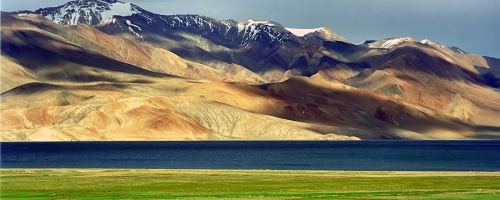Sign up to our newsletter Back to news
Terrorism: Whom does India fear?

According to international media headlines, terrorism seems to hit everywhere and every day. In some places, the threat is new, in other places terrorism has been around for decades. India, too, is not spared of terrorism. India has been plagued for years, and still is, by domestic terrorism, the Maoist Naxalites, initially possibly inspired by China, continuously sustained by domestically grown social injustices. In certain areas, local unrest against state authorities is seen and treated by authorities as terrorism. India is a huge country with a huge population split into a vast number of ethnic, religious and other groups distinguishing themselves from each other; it is a universe. It cannot dream of being free from all facets of mankind and human society. A different type of national threat is international terrorism. India’s terrorist trauma for over half a century dates back to partition, when the Indian Muslim leadership, at the moment of independence from British colonial rule, broke away and took with it the North-West of undivided India with half of the Muslim population and founded Pakistan, the first Islamic Republic. Taking Islam as the primary distinction for statehood, Pakistan has never accepted that Kashmir, widely populated by Muslims, remained in the Indian Union. Ever since, Pakistan has fought a proxy war against Indian authorities in Kashmir using terrorist groups and methods to “win over” Kashmir for Pakistan. Terrorism can be contained, sometimes eradicated, but never successfully so, when it is the expression of a national aspiration of a neighbour. Pakistan will never “win over” Kashmir, but cannot be stopped from harassing its neighbour India. Pakistan may be a failing state, but it does not lose its capacity to harbour and even to promote terrorism against its neighbours, not just against India. Afghanistan and Iran are also affected by terrorism out of Pakistan. Generating and sustaining terrorist activities across national borders absorb and bind huge forces and funds. One would think that a failing state lacks the necessary forces and funds for such destructive policies. The example of Pakistan demonstrates the fatal impact of failed statehood in one country on the stability of wider regions. Pakistan is not a generalised threat to others BECAUSE it has the necessary forces and funds for it, but because it DOES NOT HAVE the forces, funds and means to ban terrorist organisations from operating out of its territory. The most illustrious case of malfunctioning statehood may have been the shelter given to Osama bin-Laden by Pakistan most probably knowingly. It should amaze rational strategic thinking that Pakistan could host the one-time “leading international terrorist” and enemy number one of the United States, Osama bin-Laden, while at the same time entertaining a strategic alliance with the same United States of America and not even losing this ally when US forces detected bin-Laden in his Pakistani hiding place and destroyed him there. A recent study*) of the International Institute for Strategic Studies, IISS, categorizes Pakistan’s policy with regard to terrorist groups in its country as a case of “Ruthless pragmatism of being selective and deceptive”. In fact, the Pakistani leadership, in order to advance the nation’s strategic interests, or at least what the leadership considers to be of strategic interest, has over the years and in particular since the 9/11 attacks, developed a strategy of talking and fighting with armed groups, which bought them time and influence in its permanent conflict with a perennially unmanageable situation in Afghanistan. Selective and by moments deceptive talking and fighting is Pakistan’s strategy against seemingly undefeatable Taliban or Al-Qaeda. Back to India. The Indian Union may not be part of the current chaos in the Middle East. But bearing in mind that the recent so-called “Islamic State”, IS, in Syria and Iraq is heir to the older terrorist organisation Al-Qaeda, which in turn is one of the causes of Pakistan’s permanent instability and inability to ban terrorist organisations and other armed groups from its territory, one cannot help recognising that India will remain affected by the Middle East conflict. This may explain the major strategic shift in India’s foreign policy when, a few years ago, it replaced its earlier support for the Palestinian cause by support for and cooperation with Israel. Thus, India established a direct line of alliance with the USA. As long as the USA remains allied to Pakistan, India’s strategic shift, however, may not be able to earn the strategic benefits expected, but under Prime Minister Modi, the choice has been confirmed and strengthened. A more general lesson out of this sketchy analysis is that international terrorism needs failed or failing states in order to grow and launch attacks on targets in stable and functioning states. Yet, the main targets and victims of terrorism will always be in failing and failed states. This logic will sustain the vicious circle generating again and again terrorism. Rebuilding stable and functioning states out of failed states is the only sustainable way out of that vicious circle. Indian Kashmir will remain a target of armed groups operating out of Pakistan, because they are tolerated by Pakistan, as long as Pakistan cannot be transformed into a stable state. Only, when Pakistan will no longer be compelled, as a survival strategy, to choose which armed groups to select and which ones to deceive in order to successfully advance its national interests, will it end to be India’s eternal enemy.
25th July 2016 / Philippe Welti
*) Pakistan: fighting and talking to Islamist militants since 9/11, in: Samir Puri, Fighting and Negotiating with Armed Groups. The Difficulty of Securing Strategic Outcomes. IISS, London 2016
Comments :
- No comments


Post a comment